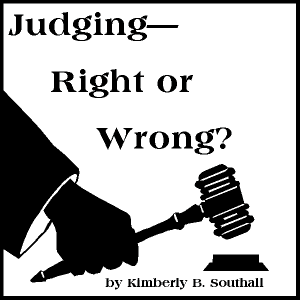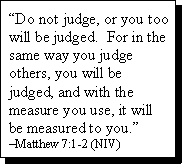
| Please note: Each scripture
is linked to The Bible Gateway. Scriptures will open in a separate
window in your browser while this window will also remain open. You
can click back and forth between the two windows. Once you have read
all of the scriptures, you can close that window. |
Judging is a subject which many Christians like to
avoid. When pressed to defend one's position, though, there often seems
to be a distinct division–those who think no one should judge anyone else
for any reason, and those who tend to pass judgment on everyone for everything.
So which position is right, according to God's Word? Neither.
The fact is that Christians are not only permitted
to judge, but in certain scriptures they are instructed to do so. However,
there are restrictions on what and how we are to judge.
 Opponents
of Christians judging are quick to point out the "do not judge, or you
too will be judged" scripture (Matthew
7:1; Luke
6:37), yet they either stop short of or fail to understand
the meaning of Matthew
7:2 which continues, "For in the same way you judge others,
you will be judged, and with the measure you use, it will be measured to
you." So what does that mean? Opponents
of Christians judging are quick to point out the "do not judge, or you
too will be judged" scripture (Matthew
7:1; Luke
6:37), yet they either stop short of or fail to understand
the meaning of Matthew
7:2 which continues, "For in the same way you judge others,
you will be judged, and with the measure you use, it will be measured to
you." So what does that mean?
Let's start with a good foundation for our understanding
of judging. Our foundation is upon Jesus Christ. Jesus' purpose in coming
into this world was for judgment (John
9:39). God the Father appointed Jesus as judge of the living
and the dead (John
5:22, 27; Acts
10:42; Acts
17:31; 2
Timothy 4:1; 1
Peter 4:5). It is important to note that Jesus' judgment
is just and right (John
5:30; John
8:16;
Acts
17:31; 2
Thessalonians 1:5;
2
Timothy 4:8; Revelation
16:5, 7; Revelation
19:1-2). This is because Jesus doesn't judge arbitrarily;
it is His Word which does the judging (John
12:47-48; Hebrews
4:12). God's Word further teaches that God doesn't judge
by external appearance (Galatians
2:6) but that He judges each man's work impartially (1
Peter 1:17). And finally, we will all stand before the judgment
seat of Christ (2
Corinthians 5:10; Hebrews
9:27; Hebrews
10:30; Jude
1:14-15). In summary, Jesus does the judging justly, impartially,
and by His Word. And everyone, everyone will be judged by
Jesus and the standard of His Word.
Now, let's return to the passage in Matthew
7:1-2. Since we know that we will be judged in the same
way that we judge and with the same measure we use, and we also know that
we will be judged and measured by God's Word, this passage means that we
are permitted to judge by that which we find in God's Word. It is when
we judge by other measures (opinions, wrong motives, erroneous information)
that we end up in a lot of trouble. If we judge others with our opinions,
with wrong motives, or by using erroneous information, then we can expect
the same treatment from God. Boy, that should stop us in our tracks
before judging, shouldn't it!?
However, we shouldn't be so fearful of judging wrongly
that we fail to use common sense, decency, and a knowledge of God's Word
to pass right judgment. This is what has happened to our country; we have
been turning blind eyes to all of the sin around us for the sake of not
judging so much that more and more souls are bound for hell everyday. Instead,
we need to realize that God's Word does, indeed, give us guidelines for
judging rightly against sin. Let's see what limits and qualifications God
places on making a right judgment:
In addition to the above guidelines, one of the most
important things to remember is that we are only capable of judging the
act. We are never to judge the intentions or motives of another
person–to do so would be assuming the role that only Jesus can fill. In
John
8:15, Jesus taught that we can only judge by human standards,
and we could be wrong. Only Jesus can judge men's secrets (Romans
2:16). It is the Word of God which judges the thoughts and
attitudes of the heart (Hebrews
4:12). When the Lord returns, "He will bring to light what
is hidden in darkness and will expose the motives of men's hearts" (1
Corinthians 4:5). Therefore, we can see from these scriptures
that only Jesus and His Word are qualified to judge intentions, motives,
and attitudes. We are limited to judging the act itself.
We must realize that there are some things which
can be judged now and some things which cannot be judged until later, for
sometimes it takes time for certain sins to be revealed (1
Timothy 5:24).
Christians are specifically instructed to judge the
actions of those within Christ's church (1
Corinthians 5:12-6:4). Not to do so results in much sin
within the body of Christ. In fact, God's Word teaches, "The spiritual
man makes judgments about all things, but he himself is not subject to
any man's judgment" (1
Corinthians 2:15).
The Bible gives some specific examples of things
we can judge, so long as we follow the guidelines and limitations previously
discussed. They include murder (Matthew
5:21), careless words spoken (Matthew
12:36), rebellion against authority (Romans
13:2), sexual immorality (1
Corinthians 5:3;
Hebrews
13:4), and grumbling against each other (James
5:9).
This list is certainly far from being all-inclusive.
Any sinful act which is made clear in God's Word can and should be judged.
Why? Why should Christians "stick out their necks" and judge others when
Jesus will undoubtedly do it when He returns? Think about it. Do you truly
care for others? Do you want them saved or condemned at that last day?
If you rightly judge those sinful acts now, that gives the one who commits
them the opportunity to be aware that the act is, indeed, sinful. This
gives the offender the opportunity and choice of whether or not to continue
sinning or to repent–the opportunity to choose between life and death.
The purpose in judging isn't actually to condemn, it is to hopefully, eventually
save!
Judging–is it right or wrong? Depending upon how
it's done, it can be either right or wrong. There is a right way to judge,
and that is according to the truth of God's Word, which is the same measure
by which each of us will be judged when Jesus returns. Let's do our best
to judge rightly in the hopes that others will also be ready for that final
judgment.
Copyright © 2003 Kimberly B. Southall.
All rights reserved.
|

 Opponents
of Christians judging are quick to point out the "do not judge, or you
too will be judged" scripture (
Opponents
of Christians judging are quick to point out the "do not judge, or you
too will be judged" scripture (